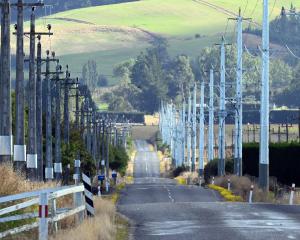Hamish Anderson takes part in some ''environmental conversations''.
Last Friday saw the completion of a Sustainable Farming Fund application for a project involving five catchments in the Clutha district.
The ultimate aim of the project is to have farm discharge compliant with the Otago Regional Council 6A water plan changes by 2020 and in-stream water standards compliant by 2026.
This will lead to better-quality water in rivers and greater recreational values.
Buy-in by farmers has been good in the catchments and has been well supported by the Otago Regional Council, Clutha District Council, Federated Farmers, Ravensdown, Rabobank and other agricultural, recreational and environmental organisations.
It is a prime example of collaboration to achieve an outcome which is beneficial to those in the catchments and the wider community.
Fast forward to Sunday and I found myself at the Aspiring Conversations event in Wanaka.
The subject was ''Water: how do we balance the competing demands?''
The participants were Tahu Potiki from Ngai Tahu Tourism; Bruce Wills, former president of Federated Farmers; and commentator and economist Rod Oram. The conversation followed a sadly predictable course.
Mr Oram set about to take every opportunity to tell us that he knew everything on and about the environment, chemistry, soil science, economics, water quality ... His main focus was that farmers were destroying the environment in New Zealand and should pay dearly to fix it and could afford to if only people (Fonterra and meat companies) would listen to him.
He knew how to get things organised so that red meat was worth $10 a kilo and dairy products consistently would trade at $15 to $25 per kilo of milk solids.
Oh, Mr Oram, where have you been all my life?
It always amazes me people with no skin in the game feel they know what the rules should be and how best the game should be played by those who have a lot of skin in the game. Mr Wills looked tired.
I guess three years as Fed's president trying to tell people that ''yes, farming has had negative environmental impacts but farmers are trying to correct things, and do be careful, because we need farming for national economic performance, as well as a good environment'' had taken its toll.
''Balance was needed,'' Mr Wills said, only to have Mr Oram say ''balance was an overused word'', and he knew what needed to be done to make everything right.
Mr Oram's every utterance was greeted with clapping.
Mr Potiki was a bit player in the conversation.
Be in no doubt that I am very impressed with the way Ngai Tahu has taken its Treaty settlement and created a Maori economic success story.
We must always be sensitive to the way the greater environment and especially water is held in cultural and spiritual significance by Maori.
Combine this with economic savvy to utilise water resources in terms of fishing and tourism and I am sure Maori will be at the forefront of any environmental debate and any measures to enhance water quality.
It was said at an earlier Aspiring Conversation that by later this century about 75% of world GDP would occur in 600 major cities.
Now here's the point: New Zealand's population does not even make a decent-sized city.
We all have an environmental footprint, whether it is an urban dweller flushing and forgetting, only to have their effluent come out partially treated from a sea outfall or a farmer who needs to tidy up their off-farm discharges into waterways.
Even Mr Oram driving over the Crown Range and flying home has a negative effect on the environment.
New Zealand needs the monetary returns from agriculture and we need cities and urban dwellers for their contribution to GDP and social diversity ... . We need each other. Without each other we would all be the poorer.
We cannot play the blame game. We must all make improvements and aim for better outcomes.
I take comfort from the fact that while not perfect we are environmentally not the worst and so with effort we can make improvements in our still beautiful country.
Back to Clutha Development; our project along with the farmers involved will make a difference to the lowland water quality of our district, province and country.
We want to, need to and will do better so that we preserve and enhance our environment and keep market access so that New Zealand can prosper and we all can enjoy our wonderful country.
So if you come across anyone making decisions on the Sustainable Farming Fund allocation of money, please tell them what a great project it is.
-Hamish Anderson is project manager at the Clutha Development Trust.











